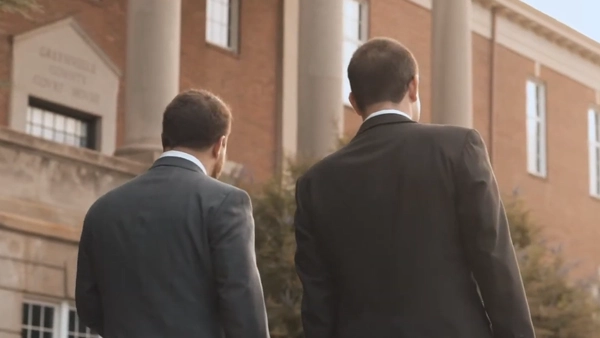Most personal injury claims are resolved through settlements. But sometimes, the other side refuses to offer fair compensation, even when an injured person is willing to negotiate or cooperate.
When that happens, the only way to pursue justice may be through a personal injury trial. It may take longer to resolve the claim, but sometimes a trial is the most effective and only way to get compensation.
At David R. Price, Jr., P.A., our skilled and experienced Greenville personal injury lawyers will guide you through every step of the process. Whether your case resolves with a fair settlement or ends up in the courtroom, you can trust us to fight for your rights.
The Personal Injury Lawsuit Process
When a person is injured because of someone else’s negligence, their primary concern should be recovery. But once a person’s immediate medical needs are addressed, the legal side of things must also be attended to immediately.
Here’s a step-by-step breakdown of the personal injury lawsuit process that we use for our injured clients:
1. Medical Treatment and Case Evaluation
Injured persons should seek medical care as soon as possible after a motor vehicle accident. Seeking timely medical care not only protects your health but also documents your injuries. During this time, your lawyer can also evaluate whether you have a viable personal injury claim.
2. Investigation and Evidence Gathering
Once we take your case, our law firm gathers medical records, accident reports, witness statements, photos, and any other evidence that supports your claim. We also identify who is legally responsible and determine the sources and amounts of insurance coverage.
3. Demand Letter and Negotiations
Once your injuries are resolved and we have concluded our investigation, we submit a demand letter to the at-fault party’s insurance company outlining your injuries, medical costs, lost income, pain and suffering, and a proposed settlement amount. From that point, we negotiate with the insurance company and attempt to resolve your case without filing a lawsuit.
4 . Filing a Lawsuit
If negotiations don’t lead to a fair settlement, then we will file a formal lawsuit. This step officially begins the litigation process and may push the insurance company to take your claim more seriously.
5 . Discovery and Pre-Trial Prep
Once a lawsuit is filed, both sides exchange information during discovery. This can include written questions, document requests, and depositions. This stage helps both sides understand the strengths and weaknesses of the case.
6 . Mediation or Settlement Talks
Many cases settle even after a lawsuit is filed, often through mediation or renewed negotiations. However, if the other side still won’t make a fair offer, then we will prepare to go to trial.
7. Trial
If your case goes to court, we’ll present your case to a judge or jury. The fact finder hear testimony, review evidence, and ultimately decide if you’re entitled to compensation and how much.
Why Some Personal Injury Cases Don’t Settle
Settling is usually faster, less expensive, and less stressful than going to trial. However sometimes, a fair resolution just isn’t possible. Here are some of the most common reasons why personal injury cases do not settle before trial:
Disagreement Over Fault
If the insurance company doesn’t believe their policyholder is responsible for your injury or thinks you share the blame for the accident, they’re unlikely to offer a fair settlement.
Low Settlement Offers
Sometimes, insurance companies offer far less than what your case is worth, especially if they think you’ll accept it to avoid a drawn-out process. When the offer is too low to cover your medical bills, lost wages, and pain and suffering, going to trial may be necessary.
Complex or High-Value Claims
When a case involves serious or permanent injuries, future medical care, or large financial losses, insurers may push back hard, especially if they think they can save money.
Disagreements Over Medical Evidence
Sometimes, the insurer will dispute your medical treatment, claiming it was excessive, unnecessary, or unrelated to the accident. These disagreements can stall negotiations and force the case toward litigation.
Bad Faith by the Insurance Company
Unfortunately, some insurance companies use delay tactics, deny valid claims, or try to drag things out in hopes that you’ll give up and accept less than the fair value of your case. These are signs of bad faith, and when that happens, taking the case to trial may be the only way to hold them accountable.
Signs Your Personal Injury Case May Be Headed to Trial
One of the first red flags is stalled or broken negotiations. If you and the insurance company can’t agree on a fair settlement amount or if they stop responding altogether, it may signal that the insurance company is not taking your claim seriously.
Another sign is when the insurer begins to aggressively challenge your medical treatment, suggesting that your injuries aren’t as serious as you claim, or that some treatments weren’t necessary.
You might also notice the insurance company trying to shift the blame. If they start arguing that you were partially or fully responsible for the accident, or if they deny liability altogether, it can make an amicable settlement much more difficult to obtain.
Finally, if your attorney begins discussing depositions, subpoenas, or expert witness testimony, it’s often because they see a trial on the horizon and want to make sure you’re ready.
What to Expect in a Personal Injury Trial
A personal injury trial begins with jury selection, where attorneys from both sides work to seat an impartial jury that will decide the outcome of your case. In a bench trial, a judge will hear the case instead of a jury.
Once the trial begins, both parties present opening statements. Your attorney will explain the nature of your injuries, how the accident happened, and why the other party is responsible. The defense will try to counter those claims and minimize the defendant’s liability.
Next comes the presentation of evidence and witness testimony. You may be asked to testify, along with medical experts, accident reconstruction specialists, or anyone who witnessed the incident. Each side will have the opportunity to cross-examine the other’s witnesses.
After all evidence has been presented, the trial moves to closing arguments. This is each attorney’s final opportunity to connect the facts to the law and persuade the jury or judge.
After closing arguments, the jury will deliberate privately to decide whether the defendant is legally responsible for your injuries and, if so, how much compensation you should receive.
If the jury sides with you, they’ll award damages based on your medical expenses, lost wages, pain and suffering, and other factors. If the verdict doesn’t go your way, you may have options for appeal.
Contact Our Personal Injury Lawyers in South Carolina Today
Trials aren’t something most people expect or want, but they are sometimes necessary to recover the full compensation for your medical bills, lost wages, pain and suffering, and long-term damages.
At David R. Price, Jr., P.A., we have the honor of representing countless injured clients across South Carolina. We understand the personal and financial toll an injury can take, and we fight to help our clients recover full, fair, and complete compensation.
Contact our South Carolina personal injury attorneys at 864-271-2636 for a free consultation.







